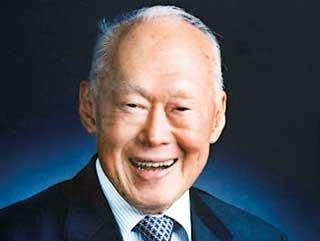Sri Lanka – In Lee Kuan Yew’s words

Lee Kuan Yew’s views about Sri Lanka have been published in three books, the first is ‘From Third World to First’, the second is ‘Lee Kuan Yew -The man and his ideas’ and the third is ‘Giants of Asia - Conversations with Lee Kuan Yew’. The first is his memoir while the other two are a compilation of his speeches and interviews.
For the sake of authenticity references will be provided ‘From Third World To First’ as [1], ‘Lee Kuan Yew – Man and his ideas’ as [2] and ‘Giants of Asia – Conversations with Lee Kuan Yew’ as [3] with the corresponding page number where appropriate.
He states that ‘Ceylon was Britain’s model commonwealth country’ [1, pg.461] and that ‘Ceylon had more resources and better infrastructure than Singapore’ [1, pg.460], he attributes this to Lord Mountbatten’s presence in Kandy [ibid], which could be some proof to say that he had a positive outlook of Sri Lanka and wished if Singapore had the same infrastructure as Sri Lanka.
He was full of praise of the capital city Colombo when he states that ‘Colombo was a better city than Singapore’ [2, pg.14/22], and he was ‘impressed by the public buildings’ in the city [1, pg.460]. Lee Kuan Yew was aware that Sri Lanka was a country with substantial wealth when he states that ‘Sri Lanka had large Sterling Reserves’ [2, pg.14/22],
His first visit to Sri Lanka was in 1956 which coincided with the victory of S.W.R.D Bandaranaike, he calls him a dapper little man, well dressed, articulate and a ‘Pukka Sahib’ [1, pg. 460]. During his meeting with S.W.R.D Bandaranaike he states that he was elated to have won the election mandate from a Sinhala majority and during his conversations with him he felt that he spoke to him as if he was still a member of the Oxford Union debating society [1,pg.461], but he states that three years later he was not surprised to hear about his assassination by a Buddhist monk [ibid].
His second visit to Sri Lanka was in 1966, when Dudley Senanayake was the prime minister of the Country, who he refers as a gentle, resigned and a fatalistic elderly man [1, pg.462], while playing golf together in Colombo he describes an incident where Dudley Senanayake apologized to him about the encroachment of the fairways by squatters animals and huts,as he was unable to justify people for keeping open spaces in the city, He felt that Dudley Senanayake was a weak leader and did not have control over the people of the Country.
When he visited Sri Lanka for the third time in 1970, the prime minister of Sri Lanka was Sirimavo Bandaranaike whom he believed had come through a sympathy vote [1, pg.461] but he describes her as a tougher, determined and less voluble leader than her husband S.W.R.D Bandaranaike [ibid]. He praised her policy on non-aligned ideology, however he was not in favour of her policy based decision in supporting the removal of US troops from several South East Asian Countries as he felt that Singapore can have a negative impact on it [ibid].
His meeting with President J R Jayawardena took place at a Conference held in Sydney, during this meeting he says that J R Jayawardena wanted Sri Lanka to move away from socialist policies which had bankrupted the country and wanted Singapore to get involved in the development of Sri Lanka, he was impressed by his practical approach which made him visit Sri Lanka for the fourth time in 1978 [1, pgs 463,464].
Despite the positive outlook he had on President Jayawardena as time went by he started seeing his drawbacks, Lee Kuan Yew thought that his decision to start a national airline as a symbol of progress and his decision to employ a pilot as a chairman of the newly built airline as a weakness [1, pg.464]. He finally states that J.R. Jayawardena retired as a tired man who had ran out of solutions [1, pg.465].
He calls Ranasinghe Premadasa who succeeded him a ‘Sinhala Chauvinist’ [1, pg.465] and calls his decision to remove Indian Soldiers brought down during the Jayawardena government to fight the civil war as an insensible decision [ibid].
Few years before his death he mentions about Mahinda Rajapaksa stating that “He thinks he has finished the war, I have read his speeches, I knew he was a Sinhalese extremist” [3].
